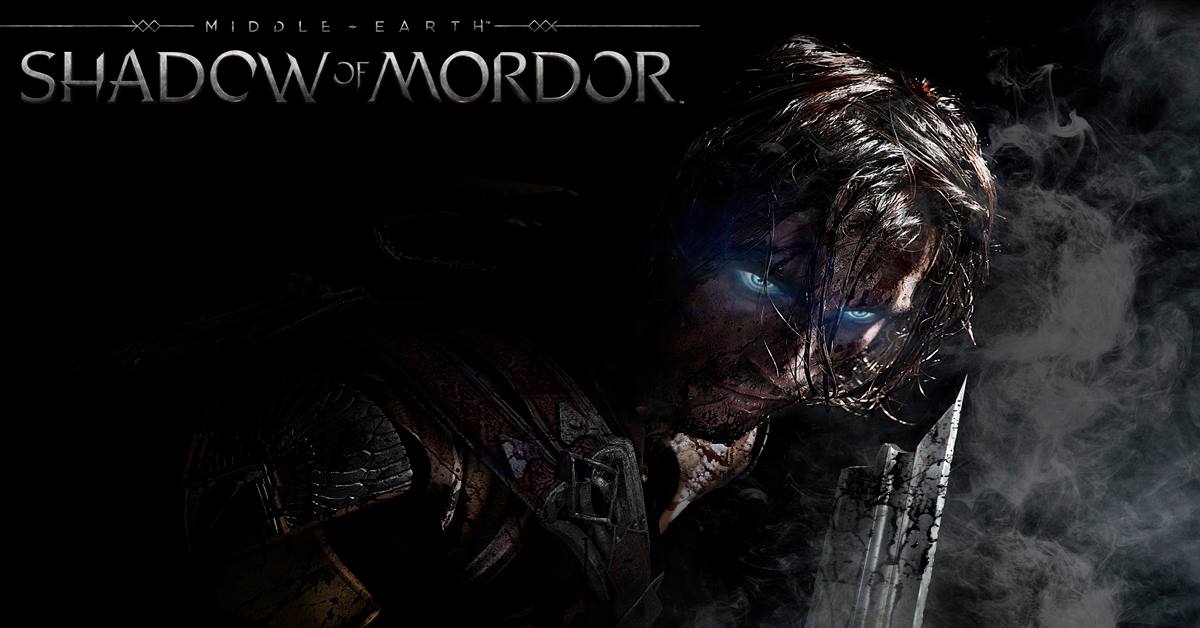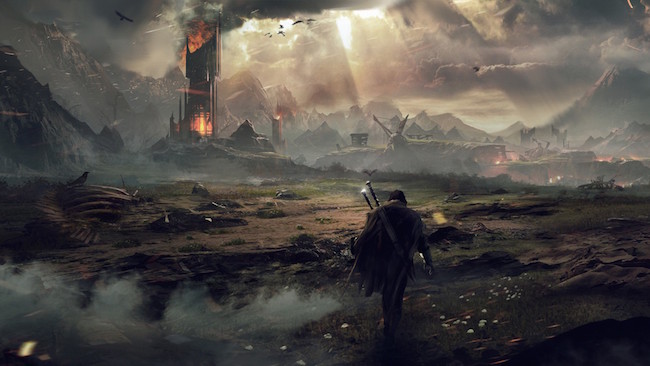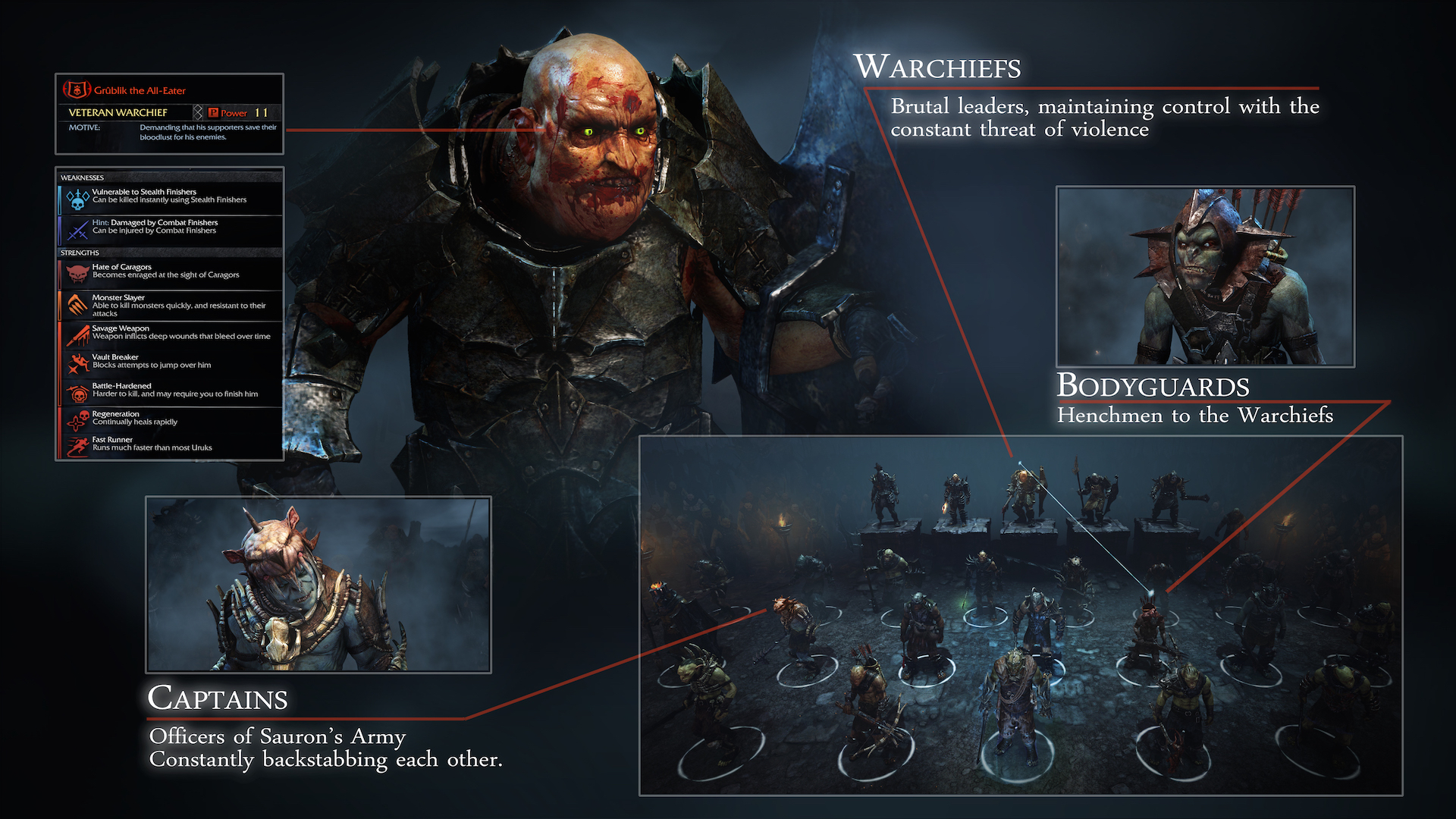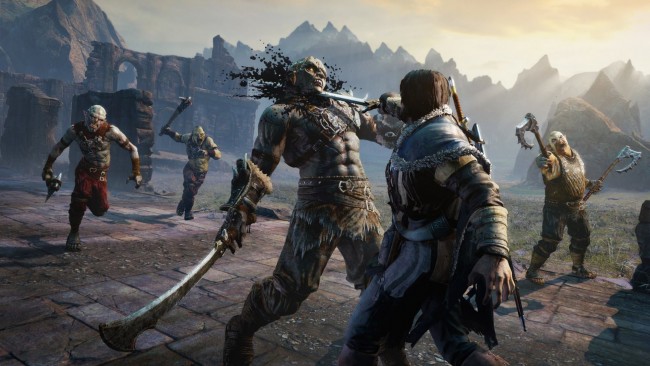
Middle-earth: Shadow of Mordor had an early trailer that left me worried. It looked in every way like an Assassin’s Creed game, only Tolkien-themed. All things Lord of the Rings are dear to me, and I didn’t dare hope for much from a game set within the main timeline that was incorporating a whole new story. I feel that it’s important to clarify that I’ve not yet 100% completed the game, but I’m very confident in my takeaways and perspective as a passionate LotR fan.
The timeline of the game takes place in between The Hobbit and The Lord of the Rings, ensuring plenty of recognisable characters and back story for fans. Our hero, or the human half at least, is Talion; a guard captain who has lived in the shadow of Mordor his entire life. The game’s intro is brutal: there are no sweeping panoramas of “Middle Zealand” with dreamy elvish narration and barefoot hobbits. Warner Brothers used the initial cut scene to make it loud and clear that Shadow is the dark side of Middle-earth’s struggle against the waking evil of Sauron and his forces. Talion and his family become part of a twisted sacrifice that leaves his family dead, while calling back the spirit of a powerful elf from the beyond. It’s a linear story, but the sizable map and changing list of targets leaves a lot of choices up to the player; it was more than four hours before I started following the plot points.

Talion’s story of vengeance becomes intertwined with the elvish wraith as they fight to recover the wraith’s identity and seek revenge for Talion’s family. After Gollum appears and agrees to assist Bright Master, we finally get somewhere closer to understanding the intentions of Mordor. Gollum, being the most well informed schizophrenic in Middle-earth, leads the Ranger and his ghostly alter-ego to find several items that piece together why the wraith and the ranger are bound together. As a huge Tolkien fan from back in the days when they were books, not movies, I felt the narrative worked as a believable part of the timeline, and didn’t feel alien in Middle-earth.
Mordor’s nemesis system takes the stealth formula, and adds the depth that’s been lacking from comparable games in the genre. What could have been a mere string of targets to find and stab became far more interesting from the first encounter onwards. Initially, it was frustrating that a captain joined in the fray by killing me with a single explosive arrow, and levelling himself up in the process. That was my first ‘you are going to PAY for that!’ moment, but not even close to being the last. The nemesis system is one of the biggest draws of Mordor; it improves on story through assassination, and crafts a strategic and tactical experience. While it’s impossible to fully control the Uruk in play, manipulating the ranks for the best outcome requires taking note of the morphing ranks and deciding on your next target with care. Picking your battles means doing the homework to learn strengths and weaknesses of captains to avoid getting caught in a fight you can’t win.

You can’t plan for every fight; captains frequently skulked out from the shadows to make things unpredictable. In these situations quick thinking and being aware of my surroundings made for engaging and unique battles, or created a chance to climb out of reach and let the caragors do my dirty work. If I focused too much on one or two promotions I wanted to influence, I found myself caught unprepared – also known as dead. Mordor is the first game in a long time that has left me swearing at an NPC for ruining my supremely clever plans, especially when infighting kills the only War Chief with any exploitable weaknesses. As an example, there was one chief I encountered who I accidentally levelled up to an almost unchallengeable level; his comments when he saw me again was just salt in the wound. I love that every target and decision have to be an intelligent move or at the very least some well-deserved revenge.
Playing on Xbox One with the sound cranked up layered the epic atmosphere of Mordor, whether in the real or wraith world. Wandering through the landscape and past groups of Uruk offered story and current quest information, as opposed to banter that becomes stale. Even the cut scenes in Mordor were worth mentioning: the character interactions were natural without being overly obvious. During a quest with Gollum, I laughed out loud at the Halfling’s musical jab at Talion. It was small things like that interaction or a Talion tantrum at Ratbag’s uselessness that brings Mordor to life. I am enjoying the way every Uruk with a name is an individual, and continues to evolve as they climb the ranks: unique targets stalking varied strongholds gives a far more personal feel to the game. Each race or beast has their look, from armour to gait, and each feels like a natural part of the experience.

Shadow of Mordor’s mechanic system is intuitive as far as stealth and free roaming go, giving me few issues throughout my time with the game so far. During the combat, the current foe is fine to parry with until several others join in the fight and priorities change. With multiple targets attacking it was difficult to keep swinging the view back where necessary; not being able to see and react accordingly left me dead several times. When free-running and acrobatics are involved, it doesn’t take much to ruin the flow of play in stealth games. The game played easily through increasingly complicated abilities, but struggled with sensitivity when climbing. It wasn’t a huge issue; it simply meant keeping the POV consistent to move deftly up and down when evading evil eyes. Initially, the focus being used up, even if arrows weren’t, felt like a waste, but after upgrading I didn’t even need arrows often enough for it to bother me.
 Nemesis system rocks
Nemesis system rocks
 WB was respectful to Tolkien’s world
WB was respectful to Tolkien’s world
 More than just a find/kill target experience
More than just a find/kill target experience
 Authentic feel to locations and characters
Authentic feel to locations and characters
 Can be difficult to keep a single target in view
Can be difficult to keep a single target in view
 Focus linked to ranged weapons is a bit awkward
Focus linked to ranged weapons is a bit awkward
Middle-earth: Shadow of Mordor offers a recognisable conglomeration of game styles, but is not content to give us a regurgitated experience. Building upon Tolkien’s world with a rich narrative and engaging characters, Shadow of Mordor ended up going from what could have been super disappointing, to a game I can’t wait to get back to as soon as I stop writing. As eager as I am to pursue all elements of the main storyline, I’ll probably go back to the game now and hunt down another war chief or two. I’m not usually the vengeful type, but sometimes you simply have to ride a caragor into camp, poison some grog, and relieve a war chief of the burden of his head.











